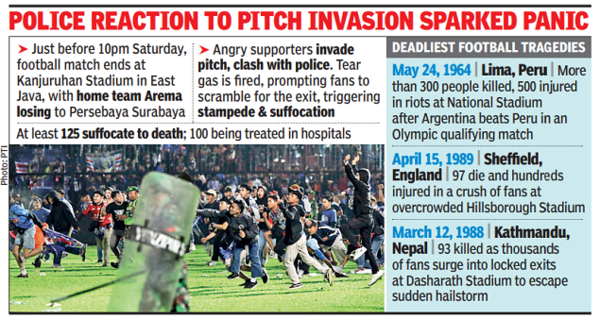Attention immediately focused on the police use of tear gas; witnesses said police beat them with sticks and shields before shooting canisters directly into the crowds.
Indonesia’s president Joko Widodo has ordered an investigation of security procedures. Fifa president Gianni Infantino called the deaths “a dark day for all involved in football and a tragedy beyond comprehension”. While Fifa has no control over domestic games, it has advised against the use of tear gas at soccer stadiums.

Violence broke out after the game ended Saturday evening with host Arema FC of East Java’s Malang city losing to Persebaya of Surabaya 3-2. Thousands of supporters of Arema, known as “Aremania,” reacted by throwing bottles and other objects at players and soccer officials. Witnesses said fans flooded the Kanjuruhan Stadium pitch and demanded that Arema management explain why, after 23 years of undefeated home matches against Persebaya, this one ended in a loss. The stadium was packed with Arema fans as the organiser had evidently banned Persebaya fans in an effort to avoid brawls.
The violence spread outside the stadium where at least five police vehicles were toppled and set ablaze. Riot police responded by firing tear gas, including toward the stadium’s stands, causing panic among the crowd. “The stadium turned into a smoke-filled battleground when police fired tear gas,” said Rizky, who came with his cousin to watch the game.
“I felt hot and stinging in my eyes, I couldn’t see clearly while my head was dizzy and everything went dark … I passed out,” he said. When he woke up, he was already in the emergency room. He said his cousin died of head injuries.
Another spectator, Ahmad Fatoni, said police had started beating the fans with sticks and shields, and they fought back. “Officers fired tear gas directly at spectators in the stands, forcing us to run toward the exit,” he said. “Many victims fell because of shortness of breath and difficulty seeing due to tear gas and were trampled upon.” He said he climbed the roof of the stands and only came down when the situation calmed.
National Police chief Listyo Sigit Prabowo said the toll, which was initially said to be 174, was revised to 125 as some of the victims were counted twice. More than 100 were receiving intensive treatment in eight hospitals; the condition of 11 is critical.
East Java police chief Nico Afinta defended the use of tear gas, saying, “We have already done a preventive action before finally firing the tear gas as (fans) began to attack the police, acting anarchically and burning vehicles”.
Indonesia’s soccer association, known as PSSI, suspended the premier soccer league Liga 1 indefinitely in light of the tragedy and banned Arema from hosting matches for the remainder of the season.
“I deeply regret this tragedy and I hope this is the last soccer tragedy in this country, don’t let another human tragedy like this happen in the future,” Widodo said in a televised speech. “We must continue to maintain sportsmanship, humanity and a sense of brotherhood of the Indonesian nation.” He ordered the sports minister, the national police chief and the PSSI chair to conduct a thorough evaluation of the country’s soccer and its security procedure.
Indonesia is due to host the 2023 FIFA U-20 World Cup from May 20 to June 11, with 24 participating teams. As the host, the country automatically qualifies for the cup.
Ferli Hidayat, local police chief of Malang, said there were some 42,000 spectators at the game. Persebaya fans were banned from entering after clashes between supporters of the two rival teams in East Java’s Blitar stadium in February 2020. Brawls were reported outside the stadium during and after the semifinals of the East Java Governor’s Cup, which ended with Persebaya beating Arema 4-2.
Citing Fifa’s stadium safety guidelines against the use of “crowd control gas” by pitch side stewards or police, Amnesty International called on Indonesian authorities to conduct a swift, thorough and independent investigation into the use of tear gas at Kanjuruhan stadium. “Those who are found to have committed violations are tried in open court and do not merely receive internal or administrative sanctions,” said Usman Hamid, executive director of Amnesty International Indonesia.






